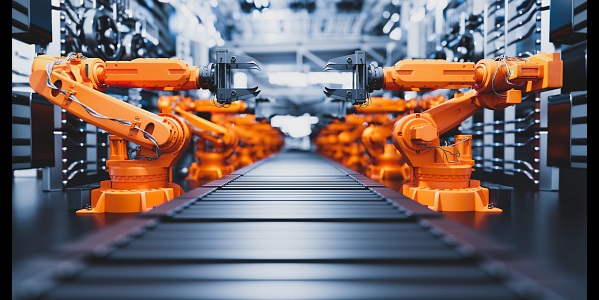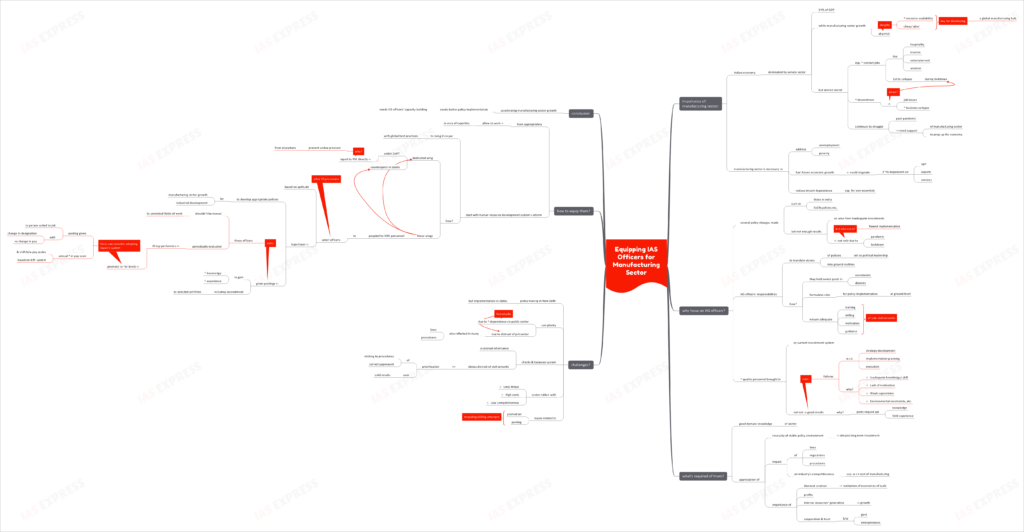Equipping IAS Officers for Manufacturing Sector

India’s economic growth in the near future depends on the manufacturing sector taking off. This is especially vital as the pandemic has dealt an unprecedented blow to the more dominant service sector. If India is to develop into a manufacturing hub, policy-level actions are necessary. However, something equally important is the proper implementation of these policies.

This topic of “Equipping IAS Officers for Manufacturing Sector” is important from the perspective of the UPSC IAS Examination, which falls under General Studies Portion.
Why is manufacturing sector important?
- The Indian economy is dominated by services sector (accounting for 54% of GDP), while the manufacturing sector growth remains abysmal. This is despite the availability of abundant resources and cheap labor- ingredients necessary to make India a global manufacturing hub.
- The high contact jobs in the services sector, like hospitality, tourism, aviation and entertainment, were the 1st to collapse when the lockdown was imposed.
- The high dependence on services sector meant that the lockdown triggered a massive wave of job losses and businesses’ collapse.
- Even now, as the services sector continues to struggle to return to normalcy, post-pandemic, the situation calls for a strong manufacturing push.
- A rapidly growing manufacturing sector is key to addressing the issues of unemployment and poverty.
- Apart from employment concerns, manufacturing sector growth is key to future economic growth- something that could stagnate if it depends primarily on services, agriculture and exports.
- It would help reduce the import-dependence for non-essential goods.
Why focus on IAS officers here?
- To realize this potential, a number of key policy changes, like the Make in India, EoDB policies, etc. have been implemented. However, these efforts haven’t resulted in a significant increase in manufacturing sector growth. Investments into the sector continue to be inadequate.
- The lack of desired results, goes beyond the pandemic’s and lockdown’s fallouts.
- Note that, while the policies’ vision is laid down by the political leadership, its translation into ground reality is the responsibility of IAS officers.
- These officers hold most of the senior posts in secretariats and districts.
- They formulate the framework rules for implementing the policies at the ground level.
- They are responsible for ensuring that the civil servants under them are adequately trained, skilled, motivated and guided towards beneficial outcomes for the society.
- The current recruitment system for higher civil services brings in high quality personnel, it doesn’t automatically translate into good results as these posts require specialized knowledge and field-experience.
- There are repeated failures in the areas of strategy development, implementation planning and execution- which are individual officers’ functions.
- There are many reasons for why existing personnel have been failing in these areas:
- Inadequate knowledge/ skill
- Lack of motivation
- Weak supervision
- Environmental constraints, etc.
- Hence, the area needing work is improving our implementation capacity.
What is required of these officers?
- It is vital for the officers to have good domain knowledge of the sector.
- The officers working in the manufacturing sector aspects relevant to policy-making need to appreciate the necessity of stable policy environment. Stability of policies is key to attracting long term investments in the sector.
- They must understand the impact of laws, regulations and procedures on the industry’s competitiveness. Specifically, they must be aware of how these policy-decisions add/ reduce the cost of manufacturing.
- They must be aware of the importance of demand creation in the realization of economies of scale.
- They must understand the importance of profits and internal resources’ generation for growth.
- They must appreciate the need for cooperation and trust between the government and the manufacturing sector entrepreneurs.
What are the challenges?
- It must be kept in mind that while New Delhi does the policy making for the most part, a lot of the implementation part is done in the states.
- Also, effective implementation is a challenge given the complexity arising from our historic dependence on the public sector. Over the decades, the policies have reflected a distrust of the private sector. This suspicion against the private sector is visible even in many of today’s laws and procedures.
- Our system of checks and balances, a colonial inheritance, continues to host distrust against civil servants. As a result, implementers prioritize sticking to procedures and correct paperwork over achieving solid results.
- The result is a sector ridden with:
- Long delays
- High costs
- Low competitiveness
- The promotion and posting related issues have been a major impediment to skilling attempts.
How can officers be better equipped?
- The IAS officers can deliver better if they are trained appropriately, allowed to work in their respective areas of expertise and motivated.
- The efforts should start with a reformation of our human resource development system, to bring it on par with the global best practices.
- A dedicated wing can be created under the Department of Personnel & Training. It should report directly to the PM, to prevent undue pressure from other quarters. Its state level counterparts can also be put in place.
- These wings should bring in human resource development personnel to select IAS officers based on their aptitude and train them to develop appropriate policies for manufacturing sector growth and industrial development as a whole.
- The officers could be selected after their completion of 10 years of service. The selected officers would then be put through appropriate training and given postings to enable the gain of more knowledge and experience.
- This could include a temporary posting (secondment) to several selected private firms to help the officers gain on-field working experience. This would give them an insight into the finer points of competing in the manufacturing marketplace.
- Care must be taken to not move these trained officers to other unrelated fields of work.
- These officers can be periodically evaluated by professionals and the top performers could be identified and promoted to the higher levels of policy- and strategy-making.
- One system that could be considered for adoption is the de-linking of salary scales from post responsibilities- something followed in Japan and also implemented by Maruti.
- Under this system, the posting is given to the person most suited for the job.
- The officer’s designation changes with the assumption of higher responsibilities, but not his/her pay.
- The annual increase in pay scales and the shift from one scale to another is in accordance with a different system.
Conclusion:
Accelerating manufacturing sector growth requires better implementation of the policies. For this, capacity building of the IAS officers helming the executive efforts is vital.
Practice Question for Mains:
Discuss the importance of equipping IAS officers helming the manufacturing sector. What are the challenges and way forward? (250 words)

